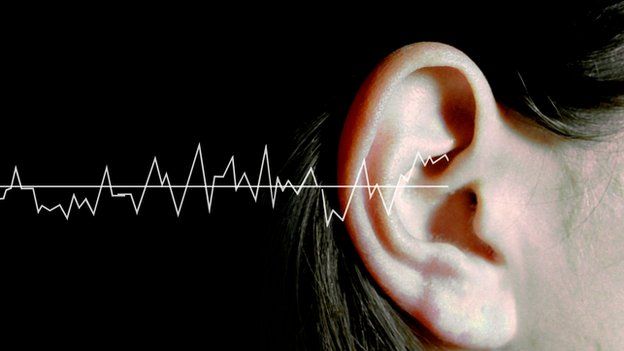How can music make your ears bleed?
- Published

A concert by reggae veterans UB40 in Cambridge has hit the headlines after fans walked out, complaining it was too loud. One woman even claimed the volume made her ear bleed. So how dangerous are noisy gigs?
It's a cliché that harks back to concerts by the rock heavyweights of the 1970s, but can music actually make your ears bleed?
UB40 fan Anna Webster said Monday's sold-out gig was "horrendously loud", with the sound - and the bass in particular - "vibrating through your whole body". She left after the first song, but while asleep that night she was suddenly awoken by blood coming out of her ear.
Dr Yujay Ramakrishnan, a ear, nose and throat specialist at the Freeman Hospital in Newcastle, said Ms Webster's ear bleed could have been triggered by the noise, but it was "unfortunate" and not something that many people would ever experience.
"The sort of picture that we tend to see with sound exposure is it tends to be after a night out - you can't hear very well and your ears are buzzing for a while," he said.
"When that temporary loss of hearing becomes more permanent - that's something that happens over a period of time.
"What Anna's describing - the way she's describing the sound ricocheting off the walls and the bass and everything else - suggests something like a barotrauma.
"There's some tiny little vessels called capillaries and I think they must have just burst with the pressure that was coming through the ear. It's a relatively rare situation."
In Miss Webster's case, her already perforated ear drum from childhood may well have been a contributory factor. However, Dr Ramakrishnan said there were still health risks associated with noisy gigs.
He said positioning yourself at concerts was key.
"If you are close to a sound source - such as a speaker - you are close to a lot of pressure waves," he said. "Direct sound exposure often doesn't cause capillaries to burst, it's the pressure.
"The ears simply haven't got enough time to adapt to the variation in the sound and fluid can either build up behind the ear drum or if the sudden pressure is loud enough, it can cause your drum to burst."
But it's not just volume that's an issue - your age could also play a part in how sensitive you are to sound, through a process called loudness recruitment.
Hence why a UB40 concert audience mostly made of up those in their middle ages may have found the volume more uncomfortable than if the band was playing to a crowd of 20-year-olds.
While it is not known exactly how loud Monday's concert was, health and safety law at the venue states that the continuous sound level should not have exceeded 107 dB, with the peak sound pressure level not exceeding 140 dB.
When you reach 130 db, the sound level is close to that of a plane taking off, Dr Ramakrishnan said.
David Horrocks, a Hertfordshire-based environmental health consultant specialising in acoustics and noise, said smaller venues, because of their lower ceilings and flat hard surfaces, reflect sound waves more and could make a band appear louder than if they were performing at a large venue.
"In my experience a lot of sound technicians don't take license of smaller venues, thinking they can keep their levels the same for each venue they go to," he said.
"Some engineers, particularly the ones that have done the circuits for years and years, have also had their hearing shattered and may not hear what the average punter is hearing, so the sound levels are higher."
He said there were many fairly inexpensive earplugs that people could buy that reduce the overall sound level while not limiting the bass or the treble and there needed to be a "cultural shift" for people to use them.
Dr Ramakrishnan said: "There should be a degree of common sense. You would be insane to stand by a loud speaker.
"You should always take earplugs to a concert for back-up, because you never know where you might have to end up standing."
- Published16 April 2014
- Published13 March 2014
- Published17 January 2014
- Published8 July 2013
- Published18 October 2011
- Published4 October 2011
- Published4 February 2011